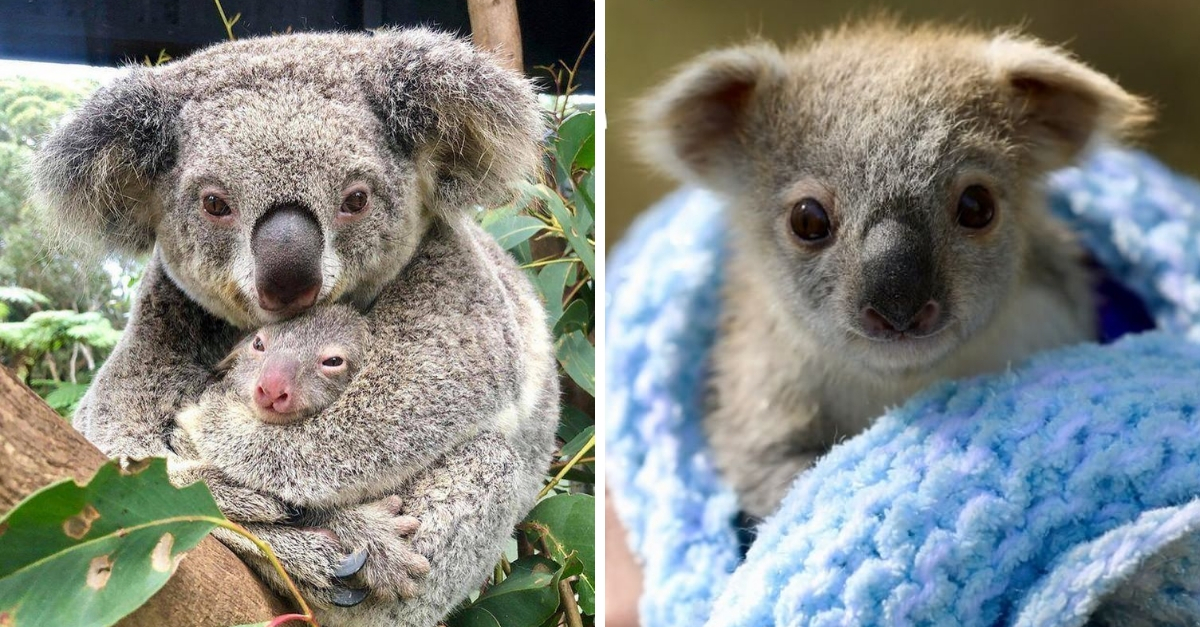
The beginning of 2020 began with heartbreak for thousands across Australia. Deadly Australian wildfires brought devastation around the country. Many lost their homes, and some even lost their lives. It wasn't until March 2 that the fires finally ceased in the state of New South Wales.
Among the most impacted populations was Australian wildlife. Conservation groups have worked tirelessly to assess damage to different animal populations while nursing injured animals back to health. A study by the International Fund for Animal Welfare reported that over 6,000 koalas were killed in New South Wales during this fire season. Many called for koalas to be classified as endangered in the wake of the fires.
Nearly three months after the first fire-free day, there is new hope. The Australian Reptile Park in Somersby, Australia, has announced its first koala birth since the wildfires. The adorable joey is a little girl whom researchers have decided to name Ash.
After the koala community was devastated by the Australian wildfires, there's been a new sign of hope. The Australian Reptile Park in Somersby shared some positive news with fans on social media on Tuesday: the announcement of the birth of a baby koala.
"We have a very special announcement … Our very first koala of the season has popped out of Mums pouch to say hello! ," read the caption of the video of the newborn joey.
"Keepers have decided to name her Ash! Ash is the first koala born at the park since the tragic Australian bushfires and is a sign of hope for the future of Australia's native wildlife."
Ash was born to mom Rosie. The joey is about 5 months old, according to park zookeeper Dan Rumsey, but she only just emerged from her mother's pouch, revealing her presence to zoo staff.
"Ash represents the start of what we're hoping to be another successful breeding season," he told BuzzFeed. "It was such an incredible moment when we saw Ash poke her head out of her mum's pouch for the first time!"
Her emergence also comes in time for the park to reopen on June 1. Staff members at the park have been working hard to take care of the animals while the park has been closed for the last few months. The closures came after the fires, due to COVID-19.
"Our dedicated staff has been working throughout lockdown to care for our animals, and now, we're unbelievably excited to reopen our doors and welcome you back!" the zoo announced in a statement on the reopening.
The Australian ecosystem took a tremendous hit due to the wildfires. The fires were deemed "contained" by the New South Wales Rural Fire Service in mid-February.
"In what has been a very traumatic, exhausting, and anxious bush fire season so far, for the first time this season all bush and grass fires in NSW are now contained," the department announced at the time.
"It has taken a lot of work by firefighters, emergency services and communities to get to this point."
University of Sydney ecologist Chris Dickman shocked many when he doubled his initial estimate that 480 million animals had been injured or killed to 1 billion.
"I think there's nothing quite to compare with the devastation that's going on over such a large area so quickly," he told KOSU.
"It's a monstrous event in terms of geography and the number of individual animals affected."
In March, a study by the International Fund for Animal Welfare and the Biolink research group estimated that at least 5,000 koalas died in the recent fires in New South Wales, about 12% of the koala population in the state. The study also emphasized that this is a conservative estimate.
What's worse is that the study found that 66% of the koala population has been lost over the past three generations. Those stunning losses are due to drought, bushfires, and human-made causes. It has conservationists calling for koalas to be classified as endangered.
"Koalas were already living on the brink before these fires, with populations declining in many areas due to excessive land clearing, disease and roadkill, and local extinctions already known to have occurred. This disaster and the ongoing nature of the threats could push koalas over the edge," says Josey Sharrad, IFAW wildlife campaigner.
"This is a koala emergency. Koalas must be immediately uplisted to Endangered on an emergency basis and a moratorium on all harmful activities impacting koalas enforced to allow surviving populations some breathing space while their capacity to recover is further assessed."
In early March, the New South Wales government said it was convening an independent panel to assess the effect the bushfires had on koalas.
"This season's significant bushfires have resulted in devastating losses to koala numbers across NSW and may have compounded their vulnerable status, so it is imperative that remaining populations and habitat are protected," a government representative noted in a statement to The Guardian.
"Although there is no firm estimate of the number of koalas affected by the recent fires, at this stage, approximately one-quarter of the modeled koala habitat in eastern NSW is within the fire-affected area."




